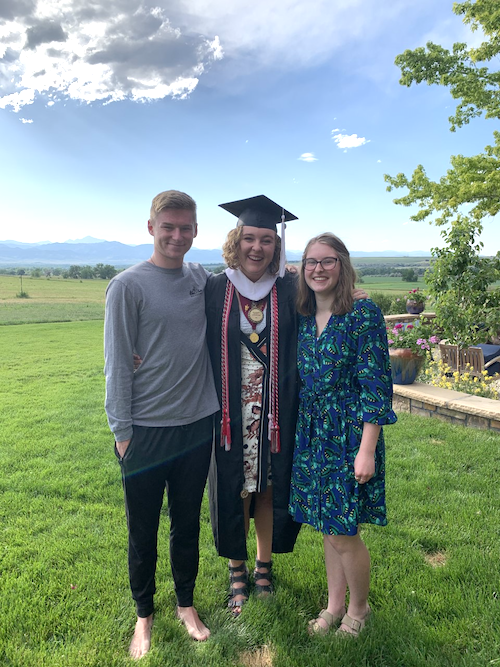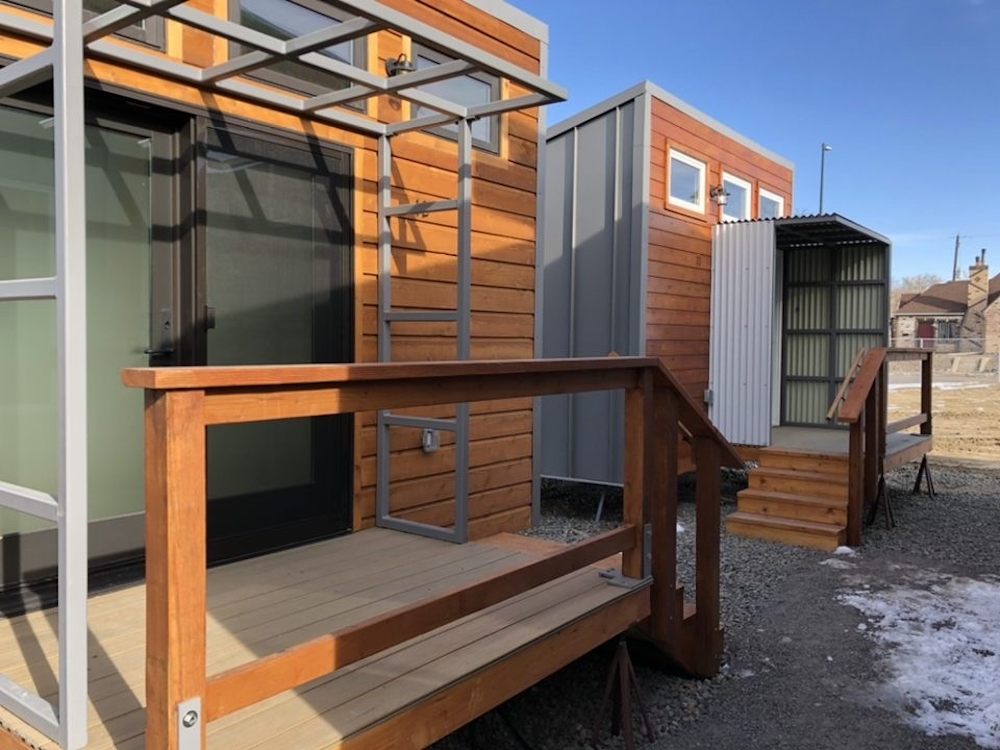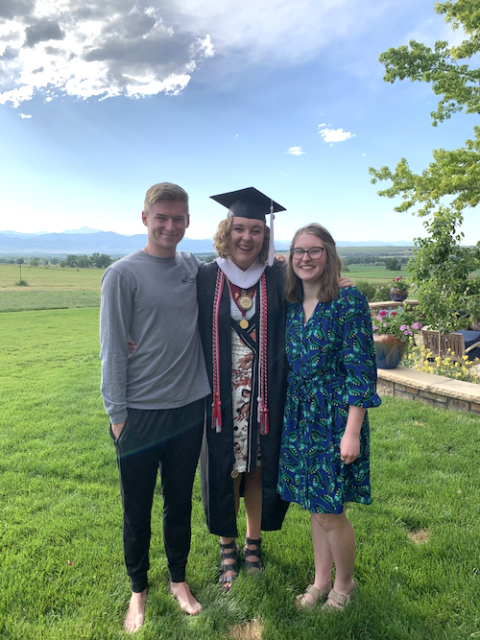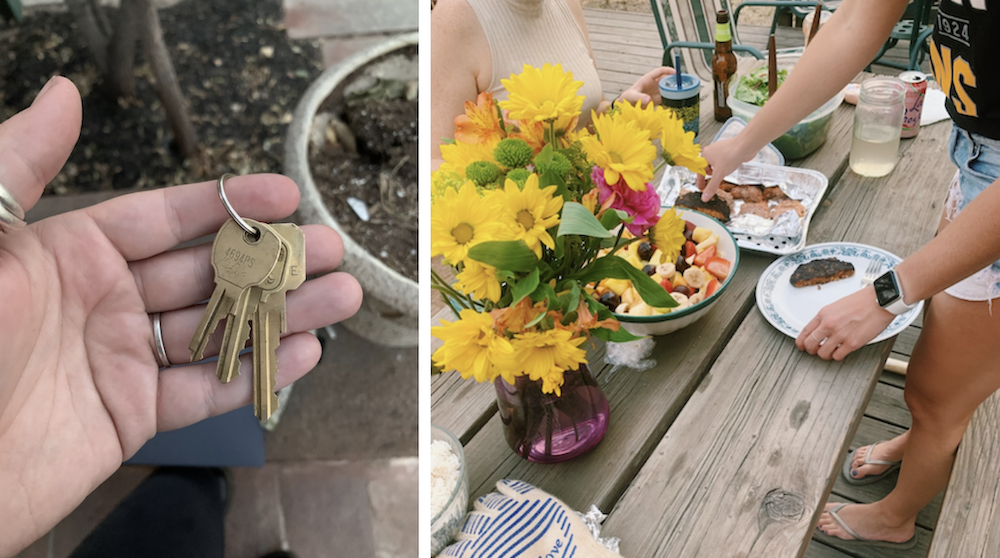
My backyard graduation with my brother, Jake, and sister, Avery. It was a day full of many mixed feelings, being at home and wanting to be at another, but still full of joy and gratitude. (Provided photo)

The tiny home village that includes the new homes some clients of Urban Peak in Denver. They will have their own units and share communal bathroom and kitchen spaces. (Ali Alderman)
Editor's note: Notes from the Field includes reports from young people volunteering in ministries of Catholic sisters. A partnership with Catholic Volunteer Network, the project began in the summer of 2015. This is our 12th round of bloggers: Ali Alderman is a Loretto Volunteer in Denver; Maddie Thompson is a Good Shepherd Volunteer in Wickatunk, New Jersey; and Celina Kim Chapman is a Good Shepherd Volunteer in New York City.
I discovered early in my year of service by way of a personality quiz — a primary source of personal enlightenment for us folks under 30 — that I am a big ideas person. The quiz called me a pragmatist: I tend to consider the wider picture, prefer to discuss things theoretically and see how big ideas can be applied in reality. Believe me, I felt seen, but not surprised.
I have devoted a significant amount of thinking to the concept of home. I spent the first 18 years of my life before college in the same house in Lakewood, Colorado, so moving several states away to Seattle and living independently for the first time required some redefining of what home meant to me. It took months of intentional effort and, as my family refuses to let me forget, innumerable tears for me to build a new home. My home was not just the tiny dorm rooms and apartments, but also my community and familiarity with the city: running into friends while out and about and not needing to map my way home made me feel like Seattle was mine.
Advertisement
Returning to Colorado at the end of college was not as comfortable of a transition as I expected. Rather than spending my last spring of college on campus with friends and members of the campus community, then spending a few short months with my family before moving into the volunteer house, I finished my classes from my parents' house, graduated in my living room and spent eight months frustrated with being home. My concept of home, already complicated by what felt like my two different lives in Seattle and Colorado, became fraught with negative feelings toward both — grief, anger, powerlessness.
Then came time to rebuild again, this time with strangers. My housemates and I had to figure out what home meant for us together in a space crowded with mismatched furniture that was not our own, with precedents for where things ought to go and how things ought to be set by the volunteers before us.
In some ways, I love being a part of the 120-year lineage of our house's residents, and I also often felt like a guest just passing through. As an added challenge, we were asked to come together according to our program's community values and walk intentionally with one another. This was like no roommate agreement I'd ever encountered.
In my work with unhoused youth in Denver, I am constantly considering what it means to have a home. Can one find or feel at home without a physical structure? I wonder what it means when home must be constantly changing, when the way my clients make a home makes them social pariahs, when home is unsafe. Some of my clients would say that they do have a home on the streets.

My backyard graduation with my brother, Jake, and sister, Avery. It was a day full of many mixed feelings, being at home and wanting to be at another, but still full of joy and gratitude. (Provided photo)
In my conversations with them, I've learned that rather than home being a location, they find safety and comfort — things I have learned are elements of home for me — in their friends and street parents and at Urban Peak. Certainly, this is not to say that my clients are all committed and happy to be on the streets forever; I think in one way or another, they are all hoping their street life is temporary, that home will eventually be a stable, physical place. However, the jump from the streets to housing is not so simple.
Even though having a home seems like the most natural of human desires, I've witnessed how housing can be difficult for our youth after they have made the streets their home. Being housed often cuts them off from their community: Their friends remain outside and together while they are indoors and alone. It is not uncommon for youth who have recently transitioned into housing to still spend a few nights a week on the streets. What may seem like safety to people who have never been unhoused, like a locked door and a place of one's own, feels drastically different to someone who may have found safety in a tent with several friends surrounded by their street families.
And still, one of the greatest gifts of my job is seeing the joy on my clients' faces when we tell them they're getting housed. Recently, we housed a handful of our more at-risk youth in a new tiny-home village for women and trans people. This in particular felt like a colossal win because the village caters to people who are not quite prepared for permanent housing. Residents will have up to a year to live in their own tiny homes while they work toward stabilization in other parts of their lives: mental health, sobriety, employment, gathering personal documents, among others. To see my clients so elated about finally having a place of their own while also knowing that they might grieve leaving the streets or feel nervous about moving into housing is evidence to me that having a place is only part of the equation.
All of this to say, home is complicated, especially for unhoused youth.

Left: The keys to my newest home, taken after signing my lease. Leaving my volunteer program was an extremely difficult decision, but I am looking forward to the next chapter, beginning with these keys. Right: Mealtime at the Denver Loretto Volunteer House, which was my home from August to mid-November. Meal times were some of the homiest times. (Ali Alderman)
In a similar way to the complex feelings I have both personally and in my work around the concept of home, I feel a mixture of joy, grief, stress and excitement as I write this post. I recently made the choice to exit my volunteer program early, choosing instead to pursue a paid position with my placement site, Urban Peak. Making my third pandemic move, I'm settling into a new space in Denver and practicing calling it home.
Unfortunately, this move means this will be my last post for Notes from the Field. I am deeply grateful for the opportunity to share my reflections and big ideas on this platform, and I am saddened to be saying goodbye.
I suppose what I've learned is that home is a place, but it is also people. I don't think home can have one without the other. Perhaps it is partially the door we can lock and the walls we can decorate the ways we want, but I believe it is also the nets of connection and care we show one another that make us feel safe and held in the homes we make for ourselves.
[Ali Alderman works with youth experiencing homelessness as an outreach case manager with Urban Peak in Denver.]





